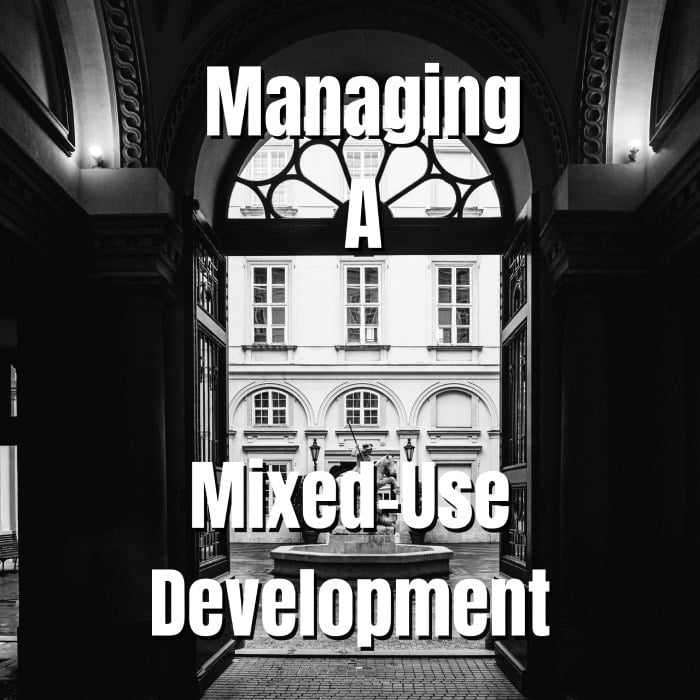Mixed-use developments offer a wealth of opportunities for investors who add them to their investment portfolio. A strategic mixed-use property performs well in both developed or suburban areas.
More residential and commercial tenants choose to live in such an arrangement because it gives them a sense of community. Other factors that cause property owners to invest in mixed-use properties include:
- Changing demographics and preferences to specific locations
- Diverse real estate market needs
- Turbulent economic times
An investor new to mixed-use property management can run into many challenges without using property management software. This tool helps to schedule tasks, communicate to tenants and receive feedback from tenants.
Today, we’ll look at critical areas to address while managing a combination of residential and commercial spaces. But first, let’s define mixed-use development.
Mixed-Use Development Definition
Mixed-use development is a property providing more than one purpose within a shared building or land. The goal of this design is for the diverse tenants to work together and complement one another. Mixed-use development combines two or more of the following uses:
- Residential
- Commercial
- Cultural
- Institutional
- Environmental-friendly industries
The most popular combination among inventors is residential and commercial property development. Two types of mixed-use development determine the extent of managing prowess you’ll need to manage your property effectively.
Vertical Mixed-Use Development
Vertical mixed-use developments combine various uses within a building. It provides public units on the ground and first floors, such as restaurants and retail shops. More private spaces occupy the upper floors like residential units, office space, and hotel rooms.
Horizontal Mixed-Use Development
Horizontal mixed-use developments consist of a single-use building within a mixed-use property made up of several buildings. This arrangement provides a variety of complementary uses, creating a walkable community.
Mixed-Use Property Management
A competent investor can turn an unused space by taking advantage of the trending mixed-use development opportunity. Marketing is key. Residents can enjoy the convenience of easily accessible retail stores, and commercial businesses benefit from the customers within the shared space. Within this setup, property owners face diverse management challenges.
Communication
Communicating with residential and commercial tenants differs because of the different lease requirements. Mixed-use development makes it harder for landlords to have strong relationships with the tenants if the communication method isn’t straightforward.
A landlord needs to provide regular updates to all tenants concerning leasing, responsibilities, and routine maintenance. If not, they’ll receive countless calls and emails. Both residential and commercial tenants want to feel informed about their community and what’s happening.
A property management software takes care of most concerns regarding communication as the program can:
- Keep track of the leases
- Track expenses and manage vendors
- Communicate with tenants in their account
- Invoice tenants
- Collect rent
Overlap Needs
Residential tenants in mixed-use development sometimes have to put up with smells, lots of foot traffic, and noise transfer from commercial business. These challenges can cause repeated disagreements with you or among the tenants. An investor with vertical mixed-use property has more challenges with these overlapping needs compared to horizontal mixed-use.
Find a way to set up realistic expectations to favor both parties. For example, you can require delivery times for retail stores at certain hours and restaurants to maintain their businesses up to a reasonable hour of the night.
Maintenance
Sharing common areas and building mechanical systems by residential and commercial tenants needs to be handled wisely to avoid one party feeling used by the other. Include clear clauses in the lease of how sharing costs will help lower overall maintenance costs for all parties.
A well-laid-out schedule with clear consequences for those that fail to maintain their responsibilities helps to foster a strong landlord-tenant and tenant-tenant relationship. A property management software can schedule these duties, and the occupants can see who’s in charge of different tasks.
Parking
Parking can be a challenge for landlords in mixed-use property management. Residential tenants want assurance that the commercial tenants won’t use all the parking for their employees and customers. Commercial tenants, on the other hand, don’t want the residential cars to inconvenience their business.
The best move a landlord can make is to separate parking for residents and commercial use. This separation is easy in the horizontal mixed-use setup compared to the vertical mixed-use property.
Employing a parking security guard will also prevent conflict arising from tenants who don’t fully comply with the rules and regulations of parking.
Mixed-Use Property Management Made Easier
Mixed-use development offers property owners multiple opportunities to maximize their investment. It also brings with it challenges that can lead to losses. UnitConnect’s property management software is the solution for the countless challenges a landlord is bound to encounter.
Start your free trial today and see the enormous difference it makes.






